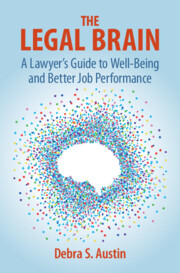Book contents
- The Legal Brain
- The Legal Brain
- Copyright page
- Dedication
- Contents
- Acknowledgments
- Introduction
- 1 The Impaired Lawyer
- 2 The Spectrum from Languishing to Flourishing
- 3 The Lawyering Culture
- 4 The Lawyer’s Brain
- 5 Memory, Knowledge, and Building Expertise
- 6 Motivation, Reward, and Developing Habits
- 7 The Impact of Stress
- 8 The Influence of Self-Medication
- 9 The Importance of Fuel
- 10 Optimizing Brain Health
- 11 Enhancing Mental Strength
- 12 Developing an Action Plan for the Neuro-intelligent Lawyer
- 13 The Neuro-intelligent Legal Organization
- Conclusion
- Select Bibliography
- Index
6 - Motivation, Reward, and Developing Habits
Published online by Cambridge University Press: 08 May 2024
- The Legal Brain
- The Legal Brain
- Copyright page
- Dedication
- Contents
- Acknowledgments
- Introduction
- 1 The Impaired Lawyer
- 2 The Spectrum from Languishing to Flourishing
- 3 The Lawyering Culture
- 4 The Lawyer’s Brain
- 5 Memory, Knowledge, and Building Expertise
- 6 Motivation, Reward, and Developing Habits
- 7 The Impact of Stress
- 8 The Influence of Self-Medication
- 9 The Importance of Fuel
- 10 Optimizing Brain Health
- 11 Enhancing Mental Strength
- 12 Developing an Action Plan for the Neuro-intelligent Lawyer
- 13 The Neuro-intelligent Legal Organization
- Conclusion
- Select Bibliography
- Index
Summary
The brain has an automated system designed to keep humans alive by promoting the search for, and remembering the location of, food. It is the motivation and reward system. The main neurotransmitter that drives our motivation and reward system is dopamine, which is the transmitter of repeat behavior. Our habits are formed by this system, and modern society offers numerous substances and activities to indulge in what can become habitual. Beneficial habits include exercise and eating lots of vegetables. Unhealthy habits include drinking too much alcohol, eating too much comfort food, and spending too much time on social media. Our habits often take hold because we use them to soothe our stress, anxiety, and depression. Habits are hard to break because they are established in our brains in networks of our brain cells.
- Type
- Chapter
- Information
- The Legal BrainA Lawyer's Guide to Well-Being and Better Job Performance, pp. 69 - 72Publisher: Cambridge University PressPrint publication year: 2024

